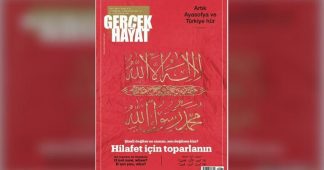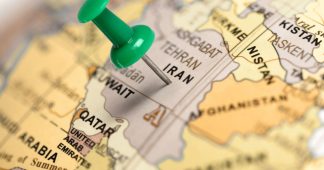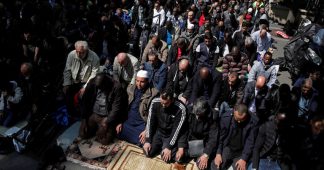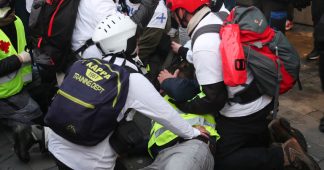President Macron defends French press freedom
The President paid tribute to the victims of the Charlie Hebdo attack today (September 2), as the trial begins and the magazine republishes controversial images of the Prophet Muhammad.
By Joanna York
Sept. 2, 2020
The attack on the Charlie Hebdo offices in Paris (Ile-de-France) in January 2015 was carried out by two gunmen who belonged to an Islamic terrorist group. They killed 12 people and injured 11 others including cartoonists and journalists working for the magazine, a police officer working as a bodyguard and a building maintenance worker.
In their latest edition, Charlie Hebdo has republished the caricatures of the Prophet Muhammad that appeared in the satirical magazine prior to the attack in January 2015.
President Macron, speaking from Lebanon yesterday (September 1), expressed support for the magazine’s right to republish the images and their right to freedom of speech.
He said: “It is never the place of the president of the Republic to pass judgement on the editorial choice of a journalist or newsroom, never. Because we have freedom of the press.”
The president also paid tribute to those who died as a result of the terrorist attack.
He said: “We all think of the men and women who have been killed in this cowardly way, because they drew, wrote, because they corrected, because they were there to help, to deliver, because they were policemen.”
Magazine republishes controversial images
In a statement, the magazine defended its decision to republish the controversial images of the prophet.
It said: “We have often been asked since January 2015 to produce other caricatures of Muhammad. We have always refused, not because we don’t have the right – the law allows us – but because there must be a good reason to do so, a reason that has logic and that brings something to the debate.
“Reproducing the caricatures this week as the trial for the attack in January 2015 reopens seemed vital to us.”
In a tweet, showing the front page of the latest edition of the magazine, Charlie Hebdo wrote: “All that for this.”
Numéro spécial : Tout ça pour ça.
Retrouvez :
? Un florilège des charognards du 7 janvier 2015
? Procès : la parole aux familles
? Sondage exclusif @IfopOpinion : la liberté d'expression c'est important, mais…Disponible dès demain ! pic.twitter.com/NyiTmva6Kr
— Charlie Hebdo (@Charlie_Hebdo_) September 1, 2020
The images of the prophet were originally published by Danish newspaper Jyllands-Posten in 2005 and then republished by Charlie Hebdo in 2006. They show the Prophet Muhammad with a bomb attached to his turban and armed with a knife.
Making representations of the prophet is banned and mocking or insulting the prophet is punishable by death under Sunni Islam law.
The decision to republish the images has been condemned by the Pakistani government as counteractive to a global will to “peacefully coexist” as it will “hurt the feeling of billions of Muslims”.
The president of French Muslim organisation the Conseil Français du Culte Musulman has called on Muslims to “ignore” the images.
Charlie Hebdo trial to be filmed
The legal trial over the Charlie Hebdo attack, which begins today (September 2) in Paris, will be filmed.
It is generally against the law to film trials in France, although exceptions can be made for those considered to be of historical interest.
This is the case for the Charlie Hebdo trial. Anti-terrorism group le Parquet National Antiterroriste (PNAT) called for the trial to be filmed on the grounds that the attack was one of the first “in a series of actions of a terrorist nature in the following months that bereaved France”.
They said the Charlie Hebdo attacks caused a wave of emotion that “broke boundaries” and “profoundly marked the history of national and international terrorism”.
The first trial to be filmed in France was that of Nazi criminal Klaus Barbie in 1987. Since then only 12 other trials have been filmed, many linked to international crimes against humanity such as crimes committed under the French occupation during the Second World War, and crimes linked to the Rwandan genocide and the Chilean junta.
The trial will not be televised live and will only be viewable under certain legal conditions once the trial and any appeals are over. The tapes will be stored in the French national archives.











